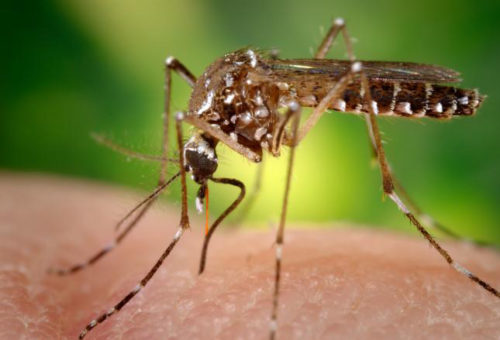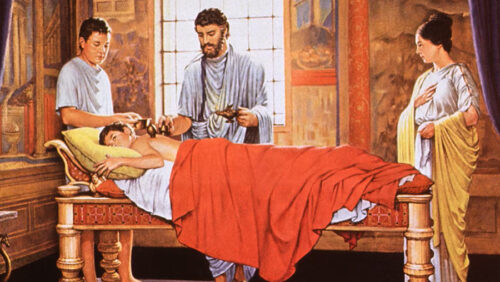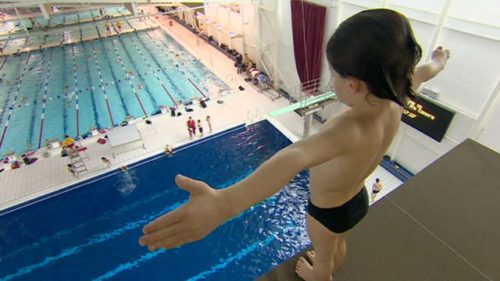For the first time in a long time that I can remember, the dislike of mosquitos has taken on an entirely new life this summer. Most certainly due to all the medical news about the mosquito illnesses and Zika; but, there are other diseases mosquitos harbor too that we can’t just rely on “citrus smells” and “bug zappers” to defeat.
Read more →
I recently followed along for several weeks as a medical information site posted their ranking of the “Top 50 Most Influential Doctors in History.” Despite the fact that I benefitted from their insight and life’s accomplishments nearly every day, I had almost no clue who many of them were.
Read more →
I’ve seen a list of the Top 50 Most Influential Physicians of All Time somewhere, I think in a physicians-only magazine called Medscape. It was compiled by physicians, I suppose from some committee somewhere.
Reviewing it, I’d heard of nearly every name on the list save it be a couple, so I typed one or two into Wikipedia to see what they had on the doctor and was pleasingly suprised with the new insight. These people had done amazing things, many against terrible odds, most with huge personal sacrifice and a few barely escaping dangerous backlash and physical hurdles (or not).
I decided to start a historical series myself, explaining in more detail their contribution to the medical care you and I take for granted today. That was more years ago than I’m proud of; but, I’m still struggling to add these tough-to-write posts to this series.
26 Posts in "Top 50 Doctors" Series
- Top 50 Doctors: Intro/Index – 10 Jun 2016
The top 50 most influential doctors in history—Judged by peers in their respective fields today. As suggested by Medscape magazine for physicians and written by Pediatric House Calls.
- 50 - Nikolay Pirogov, field surgery – 11 Jun 2016
Father of Field Surgery; anesthesia; casting; educational reform
- 49 - Henry Gray, anatomy – 3 Jul 2016
Anatomist, Surgeon, Author, Educator… Devoted Uncle
- 48 - Helen Taussig, blue babies – 3 Sep 2016
Cardiology—Awarded, Authored, Discriminated, Overcomer, Dyslexic, Deaf, Teacher, Compassionate… Life-long Learner
- 47 - Zora Janžekovič, burns – 26 Sep 2016
Burns—Everything You Hope A Doctor Would Be
- 46 - William Harvey, circulation – 12 Oct 2016
Circulation—Aristocrat, Anatomist, Physician to The King
- 45 - Virginia Apgar, anesthesiology & newborn care – 12 Nov 2016
Blue Babies—Cultured, Determined, Gentle Giant of Medicine
- 44 - Victor McKusick, medical genetics – 3 Jan 2017
Genetics—Meticulous Researcher, Compassionate Clinician
- 43 - Stanley Prusiner, neurodegenerative diseases – 25 Jan 2017
Neurodegenerative Diseases—Heresy to Orthodoxy, Hate Mail to Honoraria
- 42 - Stanley Dudrick, TPN – 28 Feb 2017
Total Parenteral Nutrition—From Beagles to Babies—A Living Legend
- 41 - Robert Koch, modern bacteriology – 21 Mar 2017
Bacteriology—World Traveler, “Bug” Hunter and Prize Winner
- 40 - Lawrence (Larry) Einhorn, chemotherapy – 16 Jun 2017
Gentle Giant—pioneer in cancer treatment
- 39 - Dr. Joseph Kirsner, GI Joe – 27 Jul 2017
Colon Cancer, IBS—“GI Joe,” “Doctor’s Doctor,” Decagenarian
- 38 - Dr. John Snow, cholera – 20 Aug 2017
Cholera—Commoner, Physician, Epidemiologist
- 37 - Dr. James Parkinson, Parkinson's Disease – 1 Sep 2017
Parkinson's Disease—Renaissance Man in the Age of Enlightenment
- 36 - George Papanicolaou, Cytopathology, Cancer – 29 Sep 2017
PAP Smear and Early Cancer Detection
- 35 - Mahmut Gazi Yaşargil, Micro-Surgery – 24 Oct 2017
Neurosurgery’s Man of the Century, Humanitarian, Educator
- 34 - Watson & Crick, DNA – 2 Dec 2017
The STRUCTURE of DNA—A “Discovery” Against Advice
- 33 - Elisabeth Kübler-Ross, stages of grief – 5 Jan 2018
Taboo Breaker, Medical Care Transformer, Hospice Founder
- 32 - Elizabeth Blackwell, women in medicine – 29 Jan 2018
Anything But Accidental, First U.S. Woman MD
- 31 - E. Donnall Thomas & Joseph Murray, Bone Marrow Transplants – 23 Feb 2018
Defeaters of Cancer, Winners of Nobel Prize
- 30 - David L. Sackett, Evidence-based Medicine – 2 Apr 2018
The “Father” of Evidence-Based Medicine
- 29 - Dame Cicely Saunders, Hospice – 23 Apr 2018
Founder Of The First Modern Hospice
- 28 - Cicely D. Williams, Kwashiorkor, Breastfeeding, Whistleblower – 21 Jun 2022
Pioneering Pediatrician, Prisoner of War, Discoverer of Kwashiorkor Malnutrition and Tireless Advocate for Children
- 27 - Charles D. Kelman - Cataracts – 9 Mar 2023
Pioneer in Ophthalmology, Surgeon, Inventor, Jazz Musician, Entertainer, Broadway Producer, Lecturer and Author
- 26 - Carlos Chagas, Chaga's Disease & pneumocystis pneumonia. – 10 Apr 2025
The "Two Candle Doctor," Malaria, American Trypanosomiasis (Chagas Disease) and Pneumocystis
A few other posts also describe physicians of note, like in the series Unaccepted Medical Breakthroughs you might like to read.
This is a “link post” which, as you know, enables me to provide “sidebar” information to you which I find useful from other sites on the web. Also, as you know, I do not link to sites full of “agendas,” “ads” or monetary gain – no matter how good they are. Today’s link: Medical consent by children for their own care.
Usually, I merely give a sentence intro; BUT this topic does require some background information so don’t click until you’ve read the short info below – it’s not long. Read more →
Pediatric Concussion Management
Getting Back in the “Game”
This video is another one of Dr. Mike Evans productions where he explains in clear language what a concussion is and how it is treated. More specifically how a child should help themselves heal so they can have the best chance of returning to full activity levels – always the goal.
It is an updated version of his previous video (still available) which includes all the new information we’ve learned about the topic over the last several years of player observation and research – and that’s a lot!
You’ll also note that this post adds to the growing collection of articles I’ve written in this series about concussion in children and teens; which not only reflects the fact that concussion makes up a huge percentage of cases of morbidity and death in the US, but that it’s also largely preventable and therefore unnecessary – as well as one of the hottest topics in medical research these days. Give all of them a look-see, the links are in the box below.
[The web site www.allkids.org/ has more information or, better yet, you can contact your own school’s administration for information about your local return to learning policies.]
Thirty-six million kids participating in organized sports across the US means that 2.6 million of them will be treated in ERs this year with sport’s injuries – and that’s not counting informal recreational activities or kids over 19.
Read more →
We’ve written about common summer problems in previous posts. But we’ve got a new crop of kids going out the front door now this season and a new crop of parents worrying about their bumps, bruises and fractures.
Read more →
Concussion 101
a Primer For Kids and Parents
The “Concussions 101” title is used by Dr. Mike Evans for his short video because it covers the basic information that kids and their parents need to understand when they’ve had a concussion – sort of like the “101” courses you take in college do.
Dr. Evans is a “family practitioner” – [we pediatricians don’t hold that against him] – who has a way with little video segments and has “hit the nail on the head” – [oops, poor analogy, sorry] – with this short summary.
Oh, this is not the complicated medical stuff that we doctors worry about; it’s merely three of the things which are sometimes considered so “simple” that nobody thinks to talk to you about them!
- We don’t wanna make things worse – we follow “return to activity” protocols to prevent life-long secondary damage.
- We can’t predict from the beginning what will happen or how you will do – “we have to prepare for the worst and hope for the best.”
- Communication – people presume you’re ok because they can’t see your brain; so, you need to be clear and honest about how you’re feeling.
Your brain is You. Everything you’ve gotten good at is stored in there; all your memories, all your skills for figuring things out for school or life are built into your brain.
Take care of your awesome brain after your concussion!
Ok, this is technically just bizarre and I’m not sure how to really present it; BUT, this issue about brain injury is just so compelling and important (if it’s true) that it clearly must not go unsaid.
The bizarreness comes because a “back-door” finding in a “brain injury and hypothermia” study showed a substantial finding about an “un-related” issue: feeding!
Read more→
Talking To Girls About Periods, Menstruation and Hygiene
Being “period positive”
It’s been so long ago now that most current young parents probably don’t even remember all the fal-de-rah that occurred in this country (US) back when “sex-education” was introduced into the official school curriculum.
Now it’s so official in the U.S. school system that most everywhere it has changed from the original “opt-in” side-bar to a teachers lesson plan into a fully-integrated, several-day portion of the curriculum only avoided by taking “opt-out” methods through official protocols.
Completely leaving out parental rights and religious issues, not discussing puberty issues with children robs them of a chance to prepare, avoid embarrassment and, as in the case of menstruation, take steps to practice adequate menstrual hygiene and avoid illness and serious complications.
Aditi Gupta, a native of India, knows all too well these current issues and described them in her current TED talk revealing that three out of ten Indian girls still don’t know about the issue at the time of their own first period. “In some areas,” she said, “it’s as high as 9 out of 10!”
Her talk was about what she and others are currently doing to break the taboo and destructive customs in her home country and around the developing world.
She advises parents that: “if YOU are ashamed about your period then your daughter will be too. Be ‘period positive’.”
We’re talking here about parents getting a good night’s sleep and we’ve already laid some extensive background in part one and discussed that good infant sleep IS possible but doesn’t come “naturally” by any means. Pretty much, by the time you’ve figured how to do it easily you’re done with having kids.
Additionally, part of that learning is coming to an awareness of how “touchy” Read more→
I’m afraid that all the things I know about the topic “sleep problems in infants” rattle around in my brain in a fairly “jumbled” manner. Frankly, the topic of infant sleep is probably the most frequently asked group of questions from new parents and in the “top 3” for all parents; but still….
The reason it’s so “jumbled” is FIRST Read more→
:








